

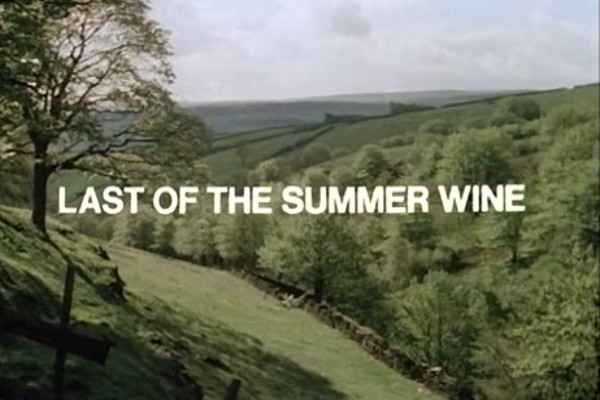
The DVD of the third series can be ordered online from Amazon. However, it's sad to report that in the month this article was published, Peter Sallis died. Aged 96, he passed away on the 2nd of June and the news was released on the 5th. This article is dedicated to him, a fine comic performer and actor...
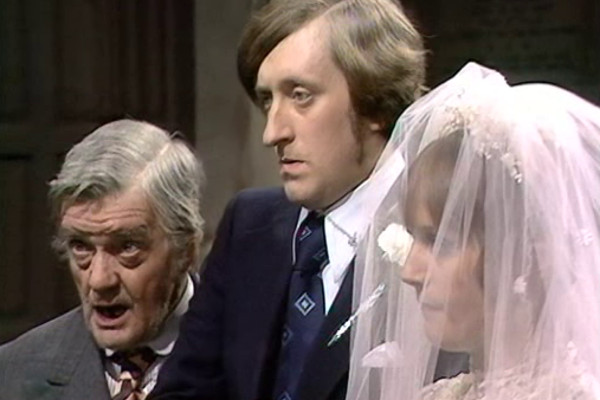
None of the series three episodes are below-par, with Going to Gordon's Wedding the most average of the bunch here. An overdone farce with some nice moments, it does undermine Compo's "sad loner" instincts by giving him an extended family. In fact, with all the various secondary characters appearing, it does rather detract from the core appeal of the series: the friendship between the three men. No longer are they forgotten outsiders, tolerated at best, but they're now a part of a connected community.
None of these extra characters were seen again in the series after this point, and when Bill Owen died in real life, Compo's TV funeral in 2000 saw these relatives revealed as being long since passed away. Particularly unmissable is Paul Luty as Compo's nephew Malcolm, who is something of a bully and a thug.
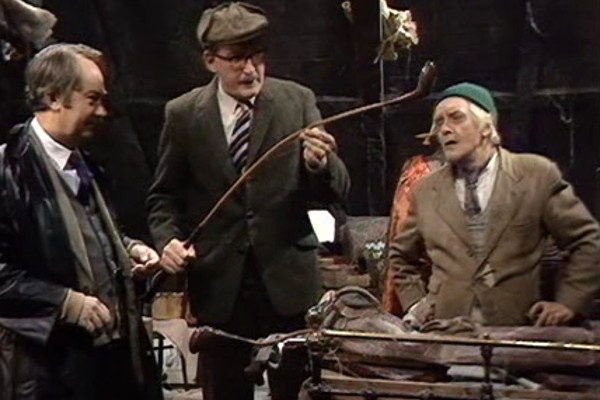
While Michael Bates was very good in the series, his more theatrical delivery is eclipsed by the arrival of his replacement, the more naturalistic and softly-spoken Brian Wilde. Wilde is such a class act that this is actually the fourth Worst To Best article to feature him, and his full immersion into the character of new third man "Foggy" is wondrous to behold.
Although this episode isn't the finest hour the series ever had, somewhat bogged down with amped-up incidental music and overegged slapstick, Wilde is on fine form throughout. Three times he gets soaked by cars driving near to him, and in another instance he falls flat on his back. His skill with light stunts is a credit to him, though it must be remembered that he was actually much younger than he appeared on screen, having not even reached fifty when this series was filmed.
Finally, there's another reminder that the series was still being screened post-watershed: Compo's line, referring to four stern-looking women, of "Fancy being up for municipal rape and finding that lot on the jury" may shock today, and isn't the only reference to rape in this series.
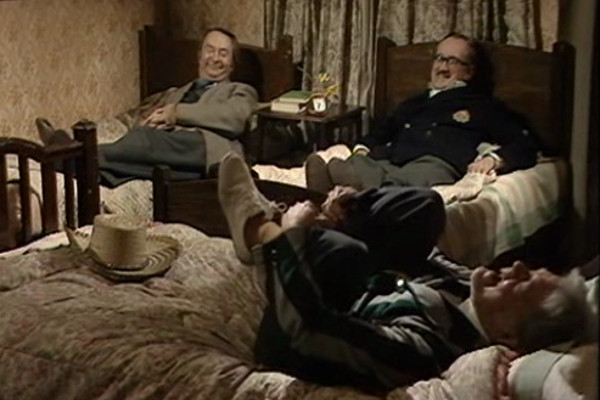
The series' first two-parter, as a leisurely trip to Scarborough offers some amusement, and occasional moments of warmth. Wilde again throws himself into the part, stripping down to his briefs for a beach scene, though I'm still at a loss as to why Compo listening to women going to the toilet is supposed to be somehow "charming", and not the work of a sex pest.
While the show is many years away from being an ensemble, Joe Gladwin does get most of the best lines as the long-suffering husband of Nora Batty: "You're not going to a funeral." "No... and with my luck I never will be." Clarke's scripts, while perhaps discarding some of the more loose, philosophical themes of previous years, are far tighter than before. While the angered political debates between Foggy and Compo could be taken as a reflection of their reputed real-life relationship, Foggy's Walter Mitty style belief in his army days is always a joy: "You forget I have a trained soldier's reflex... the first crack of a twig and I'm reaching for me bayonet."
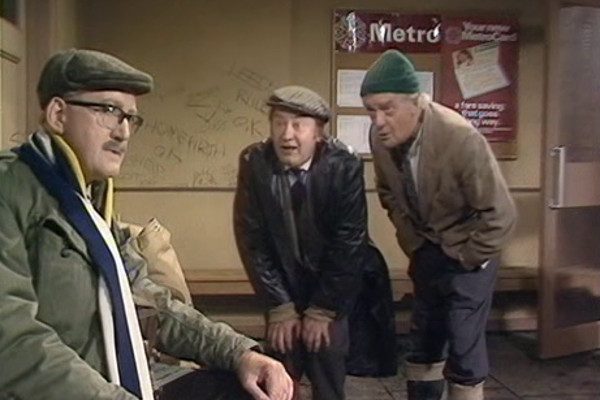
The series has such a respect for continuity that the first ten minutes of the episode are reflections on Blamire leaving town to get married, and how Compo misses him. It's a clever conceit, because it reconfirms the need for a "third man" before Wilde turns up, uttering lovably preposterous lines like "on the whole, you really shouldn't say anything to me that you couldn't safely say to John Wayne."
The episode is so leisurely that it's really only four extended scenes. The third of them, with Foggy in a pub getting punched in the face (offscreen) and left with a bloody nose, is hard to really see as comedy today, perhaps, particularly coming from a series known for being "gentle". The programme is still two series away from Compo dressed as a giant hang gliding pigeon, and even generally scales back the broader excesses that began to creep into series two. A rare example here is Foggy pushing a luggage crate up the top of a steep hill, and... well, guess...
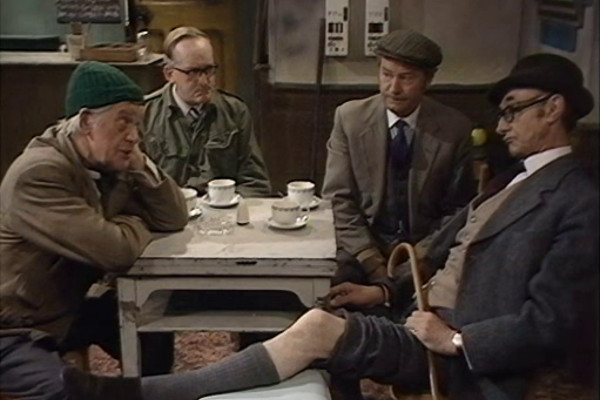
Supporting characters get a reasonable slice of screen time in this episode, in particular Sid and Ivy from the café. Sid's remark of "I stopped hitting her, you know, on moral grounds... when she nearly broke me jaw" is doubly problematical. Not only is it odd to see a gag about domestic violence when viewed today (it's not entirely clear if he's joking) it must also be acknowledged that the programme regularly features Ivy beating up Sid as part of its comic arsenal. Such things were often a tradition of northern humour, with the comic strip Andy Capp featuring Andy beating up his wife Flo as a regular element of the strip in the late 50s.
Also making a brief return is the original librarian from series one, more ingrained in the narrative than before, along with titular Stuart. But the reason for the episode ranking so highly here is the start of Foggy's real integration into the programme. With his almost non-sequitur of asking people if they want "offcuts of polystyrene", he proves to be a genuine comic original, eccentric but completely believable in the considered hands of Wilde.
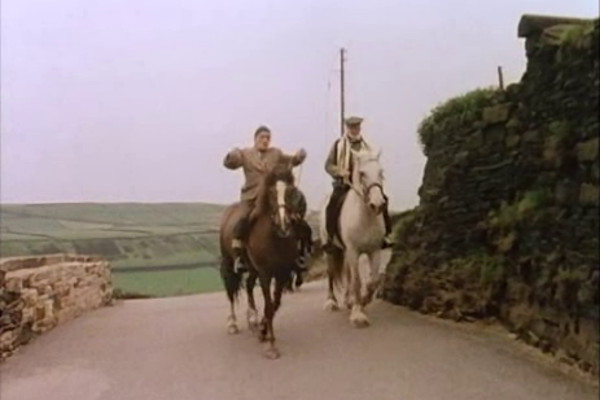
The final episode of the year's run sees a welcome return to the more leisurely, philosophical tones of the first series. The underlying bleakness of the early series can be witnessed by Compo's belief that "When tha's dead tha's dead". Yet here Foggy's pompous insults of Compo ("God, he stands there, fermenting in his wellies... covered in all the glamour of an ex-veteran of the chemical toilet platoon of the pioneer corp"... "Can't you sit still? I suppose he's afraid if he does someone will put him out for the dustcart.") are already so well ingrained in the programme that it's almost easy to forget Blamire was ever in the show.
This also marks the last appearance of the library, as the trio unwittingly destroy a table and are banned from the place, moving on in new directions for the fourth series. It's a fine ending to a fine series, reflecting on past glories while also looking ahead. Just one last question... what was in Compo's matchbox?